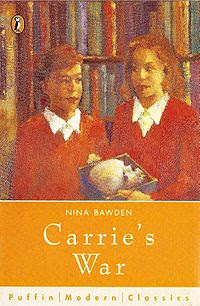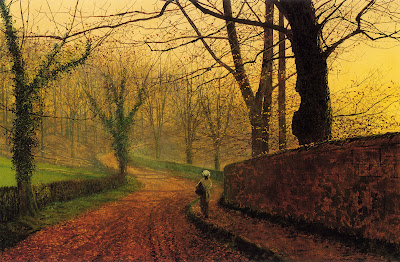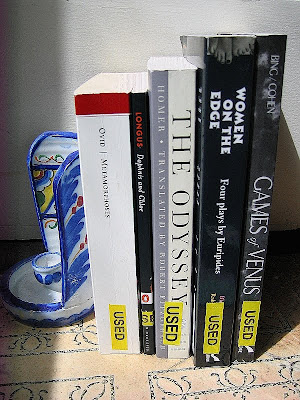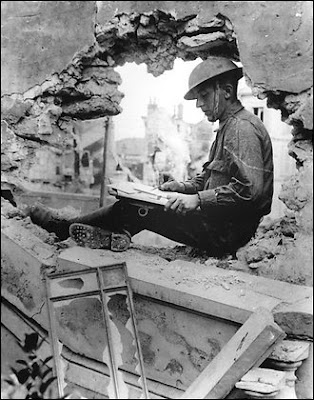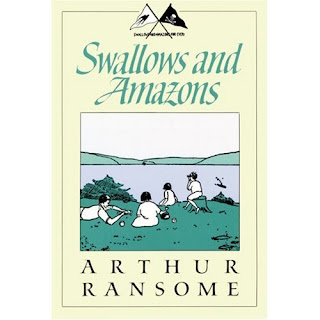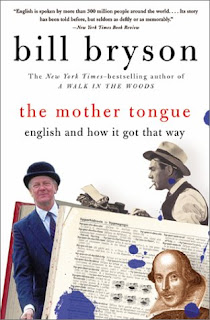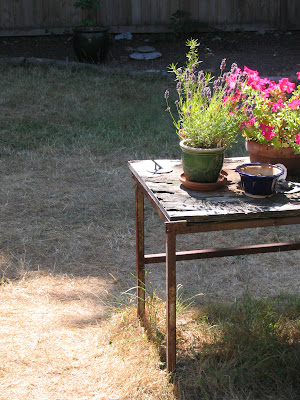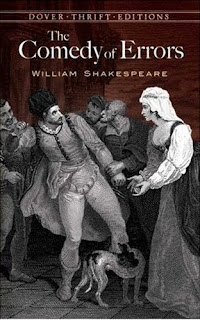 And here's proof of what Tam Lin does to my reading--not just Euripides but Shakespeare, E.R. Eddison, and a smattering of poets. I finished Tam Lin, promptly got out the Norton Anthology and just as promptly gave this over for my Complete Works of Shakespeare, and read Comedy of Errors. I've never seen this play, and not read it before. Shakespeare in the park was doing it this summer, and I did very much mean to go see it but with one thing and another never did. It's a very interesting play though in some ways distinguishes itself from the others, and I begin to see how greatly varied Shakespeare's plays can be. There's less of romance than most of the comedies I'm familiar with. By the formula of those I've read before, the comedy and the errors should be in mistaken identity which turns out funny situations between lovers, but not one of these characters is really much of a lover. It's a very funny play. I noticed far more couplets than seems usual, and is it just me or is this rather a shorter play? But I liked it. It's more symmetrical and better tied off than Twelfth Night.
And here's proof of what Tam Lin does to my reading--not just Euripides but Shakespeare, E.R. Eddison, and a smattering of poets. I finished Tam Lin, promptly got out the Norton Anthology and just as promptly gave this over for my Complete Works of Shakespeare, and read Comedy of Errors. I've never seen this play, and not read it before. Shakespeare in the park was doing it this summer, and I did very much mean to go see it but with one thing and another never did. It's a very interesting play though in some ways distinguishes itself from the others, and I begin to see how greatly varied Shakespeare's plays can be. There's less of romance than most of the comedies I'm familiar with. By the formula of those I've read before, the comedy and the errors should be in mistaken identity which turns out funny situations between lovers, but not one of these characters is really much of a lover. It's a very funny play. I noticed far more couplets than seems usual, and is it just me or is this rather a shorter play? But I liked it. It's more symmetrical and better tied off than Twelfth Night.Having finished both Tam Lin and Comedy or Errors, I then got the great joy of choosing a new book off the stack. I'm still reading The
 Mother Tongue, mind you, but slowly, and I like to have a novel on the go at the same time. So I picked The Worm Ouroboros, which I've already started and put aside twice, and which is a Tam Lin-associated book so hopefully that particular wave of reading inspiration will last me the book, at least until it begins to carry its own weight.
Mother Tongue, mind you, but slowly, and I like to have a novel on the go at the same time. So I picked The Worm Ouroboros, which I've already started and put aside twice, and which is a Tam Lin-associated book so hopefully that particular wave of reading inspiration will last me the book, at least until it begins to carry its own weight.This evening, the lasting effects of Tam Lin in combination with watching History Boys produced a desire for some poetry, so I hauled out another literature textbook I for unknown reasons possess, and read a bit. For some reason Keats' "On First Looking Into Chapman's Homer" is at present particularly in my mind (maybe because Homer is), despite a little whirlwind tour of modern poetry (which according to this book begins with Hardy). I still associate "silent, upon a peak in Darien." with Swallows and Amazons. The poem in general I associate with Tam Lin, but the bit about Darien is all Swallows and Amazons.
Had I read something out of the 18th century and something medieval, I'd have sort of done a stop on my tour in at least one bit of every age, and I did do drama, novel, and poetry, which is rather a lot for one day, really. I have to confess I have gotten pretty much nothing done but reading.





